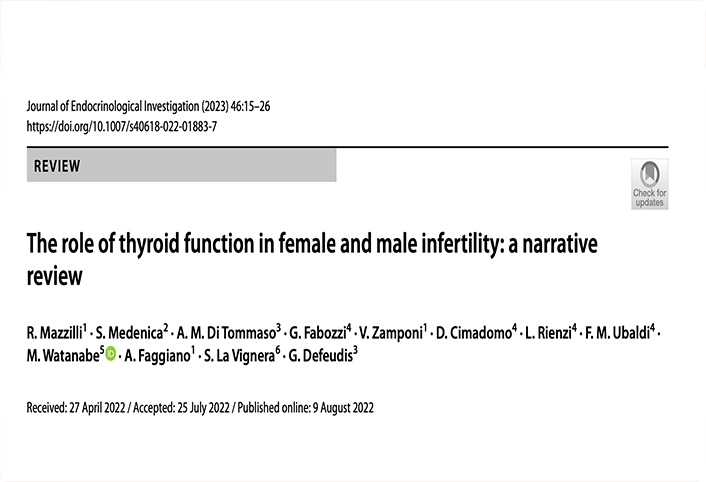
R. Mazzilli, S. Medenica, A. M. Di Tommaso, G. Fabozzi, V. Zamponi, D. Cimadomo, L. Rienzi, F. M. Ubaldi, M. Watanabe, A. Faggiano, S. La Vignera, G. Defeudis
Journal of Endocrinological Investigation 2023 Jan; 46:15–26 https://doi.org/10.1007/s40618-022-01883-7
Abstract
Purpose We herein aimed to review the new insights into the impact of impaired thyroid function on male and female fertility, spacing from spontaneous pregnancy to ART, with the objective of providing an updated narrative revision of the literature. Methods This narrative review was performed for all available prospective, retrospective and review articles, published up to 2021 in PubMed. Data were extracted from the text and from the tables of the manuscript.
Results Thyroid dysfunction is frequently associated with female infertility, whereas its link with male infertility is debated. Female wise, impaired function is detrimental to obstetric and fetal outcomes both in spontaneous pregnancies and in those achieved thanks to assisted reproduction technologies (ART). Furthermore, the reference range of TSH in natural pregnancy and ART procedures has recently become a matter of debate following recent reports in this field. On the other hand, the impact of thyroid function on the male reproductive system is less clear, although a possible role is suggested via modulation of Sertoli and Leydig cells function and spermatogenesis.
Conclusion Thyroid function should be carefully monitored in both male and female, in couples seeking spontaneous preg- nancy as well as ART, as treatment is generally immediate and likely to improve chances of success.
Keywords Thyroid · Fertility · Assisted reproduction technologies—ART · In vitro fertilization—IVF · Thyroid autoantibody · Semen